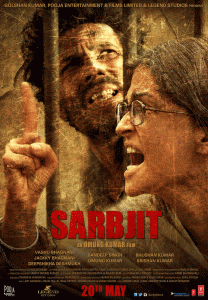Film Review: Sarabjit
By Zahra Chughtai | Movies | Published 9 years ago
Watching Sarabjit is a gruelling experience. It is a dark tale of unmitigated suffering and any longed for relief from injustice or the cruelty of fate never comes. But, then, perhaps that’s because this is a true story and life seldom has a fairy-tale ending.
Sarabjit is, in fact, as far from a fairy tale as a story can get. The film traces the plight of Sarabjit Singh, an Indian citizen who was arrested by Pakistani authorities, convicted of terrorist acts and dubbed a RAW agent. He languished in Lahore’s infamous Kot Lakhpat jail for over 20 years. Kept, for the large part, in solitary confinement, he was finally sentenced to death but his sentence kept being commuted for one reason or another. This delay couldn’t save him, however. Finally, as tensions between India and Pakistan escalated, Sarabjit was attacked and murdered brutally by his Pakistani cellmates.
Sarabjit’s family claimed that he was merely a simple farmer who had strayed across the border into Pakistan in a state of inebriation. He was tortured into confessing to being a wanted terrorist, Manjit Singh, and was subsequently never allowed to plead his case in any courtroom. His family, led by his sister Dalbir Kaur, campaigned tirelessly to clear his name and secure his release but their efforts came to naught.
This is a powerful and heartbreaking story of injustice, hatred and mistrust and the filmmaker has chosen to stick to the family’s version of events, which he has accepted as the truth. While the saga was unfolding, it was reported that some Indian sources had confirmed that Sarabjit was a RAW agent and not a simple farmer. But this film does not indulge that theory.
Indeed, if one were forced to pick sides in this argument, the real-life loyalty and conviction shown by Sarabjit’s unfortunate family lends credence to their story. Such fortitude is generally born only of truth.
Despite an obvious Indian bias — for instance, we are not told about the Pakistani prisoner who was killed in an Indian jail in retaliation for Sarabjit’s murder — the film manages not to tip over into propaganda. There are some good Pakistanis too, most notably the remarkably brave lawyer Awais Sheikh who took up Sarabjit’s case and made the fight his own. Apparently, he subsequently took up the cause of other Indian inmates languishing in Pakistan, until threats forced him to flee abroad with his family.
Aishwarya Rai Bachchan is somewhat incongruously cast as Dalbir Kaur. The actress is competent enough in the role of a wronged woman whose iron will and determination brought her brother’s story to the notice of the Indian government and media. But she lacks some of the robustness that the real-life Dalbir invokes. She is too delicate and a tad too self-conscious, even though she is de-glamourised here and pulls off the Punjabi language quite well. However, she doesn’t bring enough grit to the role or add the extra dimension that could have made this one of the most powerful female roles on the Indian screen.
Randeep Hooda, for his part, turns in yet another sterling performance as the cocky young Sarabjit, who is much petted and cossetted at home but is still a devoted family man. Broken, after the inhuman treatment he is subjected to, Randeep laces his performance with a raw, painful edge that will haunt audiences long after they leave the theatre.
As Sarabjit’s wife, Richa Chadda brings an earthy pathos to her character in an understated supporting role. The actors complement each other well and it is only the hardest of hearts that will remain unmoved by the film as it unfolds.
Any caveats about the authenticity of the story or the veracity of events aside, the film is a powerful comment on the futility of the long-standing hatred and conflict between our two countries and the untold misery it brings. There are no happy endings in a war and unmitigated belligerence breeds only darkness. As Sarabjit says wonderingly in one of his early letters to his family, “We speak the same language, eat the same food, why so much hatred?”
The film also makes one wonder how many innocents are served up as guilty and presented by the state as convicts to quell public outcries for justice in the aftermath of heinous acts.
It also brings to the fore the inhuman conditions in our jails, and probably in India as well. Here another debate raises its head: Should even the most heartless killer be subjected to such extreme conditions?
Sarabjit is a film replete with weighty issues and if even half of what is depicted is true, it calls for moral outrage at the existing status quo.
Zahra Chughtai has worked and written for Pakistan's leading publications including Newsline, the Herald and Dawn. She continues to write freelance.



